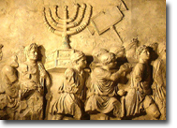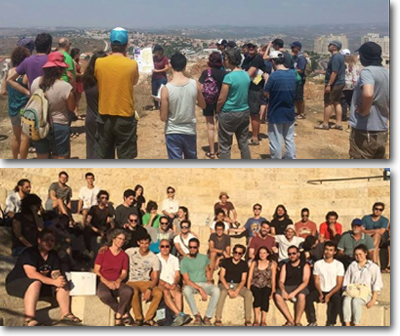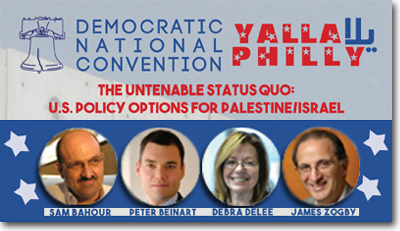|
 Tisha B'Av (the 9th of Av), which is observed beginning the evening of August 13th this year, is a
fast day commemorating the destruction of both the First and Second Temples in Jerusalem. The fast day of Tisha
B’Av is sometimes compared to that of Yom Kippur: whereas the fast of Yom Kippur is one which is intended to
restore and elevate us through the process of repentance, the fast of Tisha B’Av is considered the saddest day
on the Jewish calendar because it commemorates hatred and apathy causing the destruction of that which is most
precious. The Talmud explains that the second Temple was destroyed because, while people were behaving
abominably, the leaders of the community stood by and said nothing.
Tisha B'Av (the 9th of Av), which is observed beginning the evening of August 13th this year, is a
fast day commemorating the destruction of both the First and Second Temples in Jerusalem. The fast day of Tisha
B’Av is sometimes compared to that of Yom Kippur: whereas the fast of Yom Kippur is one which is intended to
restore and elevate us through the process of repentance, the fast of Tisha B’Av is considered the saddest day
on the Jewish calendar because it commemorates hatred and apathy causing the destruction of that which is most
precious. The Talmud explains that the second Temple was destroyed because, while people were behaving
abominably, the leaders of the community stood by and said nothing.
This year, don't stand by while right-wing Israeli leaders pass laws that silence peace activists. It is those who speak out who will bring peace and security to Israel, and it is those who wish to silence them who threaten Israel’s future.
This year, help APN and Peace Now fight back against the silence and help us secure that which is most precious for Israel: peace.
While News Nosh's Israel editor is on vacation during the holidays, we are publishing an abbreviated version produced in Washington and therefore it may be sent later in the day.
"I wonder what Jabotinksy would think about the commissar of culture who silences everyone who thinks differently from her."
 PRINCETON – Those who lead Israel’s defense establishment often come to consider peace with the
Palestinians a necessary condition for the country’s security. Being tasked with maintaining the territories
Israel has occupied since the Six-Day War in 1967 evidently causes the military and security brass to support
political measures that would end the occupation. And yet the government shows no interest in pursuing a
permanent settlement.
PRINCETON – Those who lead Israel’s defense establishment often come to consider peace with the
Palestinians a necessary condition for the country’s security. Being tasked with maintaining the territories
Israel has occupied since the Six-Day War in 1967 evidently causes the military and security brass to support
political measures that would end the occupation. And yet the government shows no interest in pursuing a
permanent settlement.
To appreciate this divide, consider the late Meir Dagan, who served as Major General of the Israel Defense Forces (IDF) and then as Director of Mossad, Israel’s intelligence agency. Several years ago, I sat on a panel at a conference in Jerusalem convened by then-Israeli President Shimon Peres. To my right sat Dagan, who had just completed eight years as head of Mossad; to my left sat Dore Gold, a former academic and former Israeli ambassador.
The two men held very different views about how best to guarantee Israel’s security, and it is worth recapitulating their respective arguments.
Gold argued that returning to pre-1967 armistice lines would leave Israel without “defensible borders.” He insisted that Israel could guard against threats from the east only if it maintained a military presence in the West Bank and controlled the Jordan River – which runs along the border separating Jordan from Israel and the West Bank.
Dagan countered that the military’s role is to safeguard Israel’s borders, regardless of where those borders are drawn. While the IDF would certainly prefer to operate with the strategic advantages that holding more territory can confer, it would fulfill its mission under whatever conditions the Israeli government set for it.
But Dagan went further...
Read
more...
 We know that pro-Israel does not mean blindly
supporting policies that are irrational, reckless, and counter-productive. Pro-Israel means supporting policies
that are consistent with Israel's interests and promote its survival as a Jewish, democratic state.
We know that pro-Israel does not mean blindly
supporting policies that are irrational, reckless, and counter-productive. Pro-Israel means supporting policies
that are consistent with Israel's interests and promote its survival as a Jewish, democratic state.
You've heard the arguments of the religious and political right-wing, and so have we. They've had their say. Now, we'll have ours.
Go HERE for all installments of APN's "They Say, We Say"
They Say, We Say: Are settlements really a problem?
To be clear: the Oslo Agreement did not grant Israel permanent control over Area C. The designation of this area as coming under full Israeli control was intended to be temporary, pending a permanent status agreement. The fact that such an agreement has not been reached – and the fact that Israel has abused its power and control over the area in the intervening years to massively increase settlements – does not give Israel any legal claim to permanent control over this area.
Moreover, legal status aside, negotiations up to this point have established clearly that Israel’s ability to retain control over any settlements under a future peace agreement will come only via mutually agreed-on land swaps, involving land of equal size and quality. There is no possibility of land swaps that could compensate for all of Area C; nor is there any possibility that Palestinians would ever agree to such a massive annexation of land – an annexation that would render a future Palestinian state politically and economically non-contiguous and non-viable.
In short, annexing Area C would, in effect, be a move by Israel to rip up the Oslo Agreement and to state that it prefers permanent conflict and occupation to negotiations and a future two-state agreement. In doing so, Israel would be openly prioritizing settlements over security and Greater Israel over Israel’s standing in the international community. It would also be a definitive step down the road toward condemning Israel to a future as a pariah state.
They Say/We Say: "Israel should act unilaterally in its own interests... for Israelis living in parts of the West Bank that everyone knows Israel will never give up"
 We know that pro-Israel does not mean blindly
supporting policies that are irrational, reckless, and counter-productive. Pro-Israel means supporting policies
that are consistent with Israel's interests and promote its survival as a Jewish, democratic state.
We know that pro-Israel does not mean blindly
supporting policies that are irrational, reckless, and counter-productive. Pro-Israel means supporting policies
that are consistent with Israel's interests and promote its survival as a Jewish, democratic state.
You've heard the arguments of the religious and political right-wing, and so have we. They've had their say. Now, we'll have ours.
Go HERE for all installments of APN's "They Say, We Say"
They Say, We Say: Are settlements really a problem?
For example, unilateral “withdrawals” that leave Israeli settlers and soldiers behind, while marketed as a step toward peace, practically speaking are no different than continued occupation. Unilateral “withdrawals” that are cover for settlement expansion in the areas of the West Bank from which Israel decides not to “withdraw” (e.g. the area west of Israel’s separation barrier, plus or minus a little, amounting to at least 10% of the West Bank), are not simply continued occupation, but are potentially lethal to the two-state solution. Such settlement expansion, under the cover of “withdrawals,” would take any mutually acceptable land swap option off the table, rendering a future agreement on borders and territory impossible (Israeli land reserves are sufficient for a swap equivalent to at most 2-3% of the West Bank, along the lines laid out in the Geneva Accord). Moreover, this brand of unilateralism would prevent the establishment of a viable Palestinian capital in East Jerusalem or any contiguity between East Jerusalem and the West Bank—and no legitimate Palestinian leadership will ever sign an agreement that doesn’t include both.
Similarly, plans to unilaterally divide Jerusalem – to rid the city of unwanted Palestinian residents ostensibly to make the city more Jewish and more secure – will have the opposite of the intended effect. As Jerusalem expert Danny Seidemann writes:
These proposals make a bad security situation worse. Security in Jerusalem is a function not of the number of Israeli security forces on the city’s streets and borders or the number of its Palestinian residents per se. Insecurity in Jerusalem today stems from Palestinian rage, fueled by despair, deriving from permanent occupation, sharpened by fears that Israel seeks to change the status quo on the Temple Mount/Haram al Sharif. Israeli statements, policies, and actions—like proposing cutting 200,000 Palestinians off from their own city—only intensify and lend credence to those fears.As for “saving” Jewish Jerusalem, Israeli governments and settlers have been working for years to establish—through housing, parks, archeological sites, and tourist facilities—a Jewish pseudo-Biblical domain in the most volatile areas of East Jerusalem (and, indeed, of the planet), that is, the Old City and its visual basin, including the Temple Mount/Haram al Sharif, all at the expense of equities that Muslims and Christians hold in the city. Suggestions to further cut off Palestinians from these areas only exacerbate this dangerous trend, which is transforming the Israeli-Palestinian political conflict, resolvable by the two-state solution, into a zero-sum religious battle.
In short, while many unilateral plans are marketed as steps toward peace, the devil is in the details – and in the details, a common characteristic of unilateral plans is that, if implemented, they risk depriving Israel of any possibility of a two-state solution, taking the country further down a suicidal path which ends with Israel ceasing to be a democracy and a Jewish state.
 We know that pro-Israel does not mean blindly
supporting policies that are irrational, reckless, and counter-productive. Pro-Israel means supporting policies
that are consistent with Israel's interests and promote its survival as a Jewish, democratic state.
We know that pro-Israel does not mean blindly
supporting policies that are irrational, reckless, and counter-productive. Pro-Israel means supporting policies
that are consistent with Israel's interests and promote its survival as a Jewish, democratic state.
You've heard the arguments of the religious and political right-wing, and so have we. They've had their say. Now, we'll have ours.
Go HERE for all installments of APN's "They Say, We Say"
They Say, We Say: Is Peace Possible?
This does not mean that Israel was required to accept every word of the API without reservation. It does mean Israel could have reacted positively and constructively to the initiative – seeking actively to engage Arab backers of the API and to promote Israeli-Palestinian negotiations directly linked to the implementation of the API. Doing so could have built Israeli popular support for peace by offering much bigger dividends for Israel, most notably by opening the door to resolving the Arab-Israeli conflict and to normalization of Israel’s relations in the region. It could also have given Palestinian leaders desperately needed regional cover in negotiating difficult compromises over core issues like the future of Jerusalem and refugees.
Today, the API remains on the table, even if Arab support for it is far less certain. If Israel is serious about peace, its leaders can still shift gears and sincerely consider the API. However, the notion that Israel can cherry-pick the API – that it can “pocket” normalization, which the Arab League clearly offered as a fruit of peace with the Palestinians, without first making peace with the Palestinians – is a delusion. Until such time as Israel is prepared to be serious about ending the occupation and achieving a two-state agreement with the Palestinians, relations between Israel and Arab countries will remain, at best, abnormal and below the radar.
 We know that pro-Israel does not mean blindly
supporting policies that are irrational, reckless, and counter-productive. Pro-Israel means supporting policies
that are consistent with Israel's interests and promote its survival as a Jewish, democratic state.
We know that pro-Israel does not mean blindly
supporting policies that are irrational, reckless, and counter-productive. Pro-Israel means supporting policies
that are consistent with Israel's interests and promote its survival as a Jewish, democratic state.
You've heard the arguments of the religious and political right-wing, and so have we. They've had their say. Now, we'll have ours.
Go HERE for all installments of APN's "They Say, We Say"
They Say, We Say: Is Peace Possible?
Certainly, Israel and Sunni states have shared concerns about Iran and other threats in the region. And it is generally accepted that Israel and many of these states have engaged in longstanding, quiet security coordination that reflects these shared threats and concerns. While such coordination may, indeed, continue and expand in the face of Iran’s new regional profile, the fact remains that until Israel is prepared to be serious about ending the occupation and achieving a two-state agreement with the Palestinians, relations between Israel and Arab countries will remain, at best, limited to relations that exist below the radar.
While News Nosh's Israel editor is on vacation, we are publishing an abbreviated version produced in Washington and therefore it may be sent later in the day.
"There has always been a large gap between the world the Palestinians see and the world the Israelis see, but in recent years this hasn’t been so much an argument over the narrative, or over the fairness or abnormality of the situation, so much as that, for every event, every death, every incident, there seems to be a Palestinian version and an Israeli version."
of his journey through the occupied territories in the West Bank
While News Nosh's Israel editor is on vacation, we are publishing an abbreviated version produced in Washington and therefore it may be sent later in the day.
the Munich Agreement of 1938 to the Iran deal


 "We strongly oppose settlement activity, which is corrosive to
the cause of peace. These steps by Israeli authorities are the latest examples
of what appears to be a steady acceleration of settlement activity that is
systematically undermining the prospects for a two-state solution."
"We strongly oppose settlement activity, which is corrosive to
the cause of peace. These steps by Israeli authorities are the latest examples
of what appears to be a steady acceleration of settlement activity that is
systematically undermining the prospects for a two-state solution."














